

5 Simple Ideas That Can Transform Your Teaching. Teaching is impossibly complex.
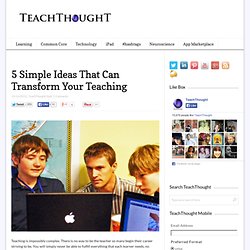
11 Essential Tools For Better Project-Based Learning. By Katre Laan from myhistro.com The rise of technology used in classrooms has made learning much more interactive.
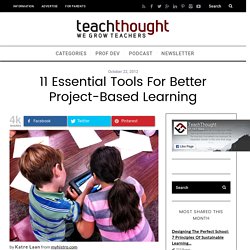
The emergence of iPads to browser-based tools in project-based learning, take teaching to a new level in the 21st century. Even the current trends in education include the use of new technology, from collaborative projects to blending traditional textbook teaching with innovative tools. How 21st Century Thinking Is Different. How 21st Century Thinking Is Just Different by Terry Heick This content is proudly sponsored by The Institute for the Habits of Mind, promoting the development of personal thinking habits in 21st century learners.

In an era dominated by constant information and the desire to be social, should the tone of thinking for students be different? The Inside-Out School: A 21st Century Learning Model. The Inside-Out School: A 21st Century Learning Model by Terry Heick As a follow-up to our 9 Characteristics of 21st Century Learning we developed in 2009, we have developed an updated framework, The Inside-Out Learning Model.
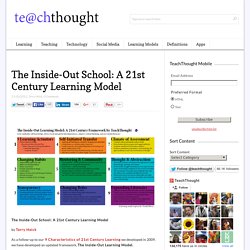
The goal of the model is simple enough–not pure academic proficiency, but instead authentic self-knowledge, diverse local and global interdependence, adaptive critical thinking, and adaptive media literacy. By design this model emphasizes the role of play, diverse digital and physical media, and a designed interdependence between communities and schools. Researching for Learning. When learning a new task, especially during a nonformal learning event, a learner normally starts out by researching the topic to discover: If the goals and objectives are complete The full scope of the learning project Background information Researching a subject or task allows the learners to discover various facts, relationships, structures, and/or models for themselves.
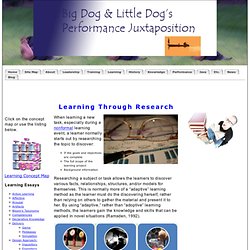
Grit, character and academic success: thoughtlessness, part 3. As readers may know, a new book is getting a lot of national press these days: , by Paul Tough.
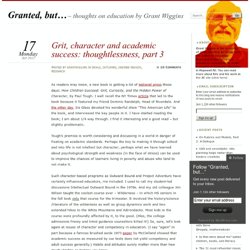
I well recall the NY Times article that led to the book because it featured my friend Dominic Randolph, Head of Riverdale.) And the other day , Ira Glass devoted his wonderful show “This American Life” to the book, and interviewed the key people in it. Personalized Learning is NOT Differentiating Instruction. The term “Personalized Learning” is a buzz word educators use to be an alternative to “one size fits all” teaching.
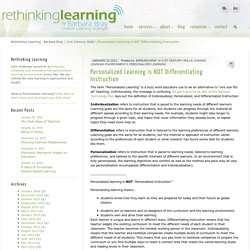
Unfortunately, the message is confusing. Ed.gov’s archive as part of the National Technology Plan lays out the definition of Individualized, Personalized, and Differentiated Instruction: Individualization refers to instruction that is paced to the learning needs of different learners. How Google Impacts The Way Students Think.
How Google Impacts The Way Students Think by Terry Heick It’s always revealing to watch learners research.
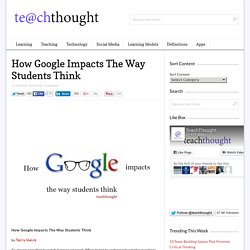
When trying to understand complex questions often as part of multi-step projects, they often simply “Google it.” As Digital Influence Changes, Let Students Create The New Internet. 25 Ways To Use Twitter In The Classroom. 5 Tools for Increasing Teacher Productivity. Teachers these days are up to their ears in work that must be accomplished each day.
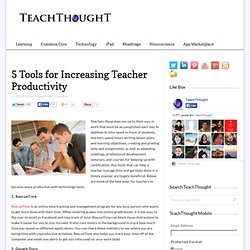
In addition to time spent in front of students, teachers spend hours writing lesson plans and learning objectives, creating and grading tests and assignments, as well as attending meetings, professional development seminars, and courses for keeping up with certification. Any tools that can help a teacher manage time and get tasks done in a timely manner are hugely beneficial. Below are some of the best ways for teachers to become more productive with technology tools. How Blogging, Texting, and Twitter Can Help Students Learn. Back in June, I read an article on the Oxford University Press English Language Teaching blog entitled “Using Technology to Improve Writing Activities” (Silva, 2012).
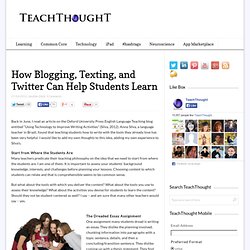
Anna Silva, a language teacher in Brazil, found that teaching students how to write with the tools they already love has been very helpful. I would like to add my own thoughts to this idea, adding my own experience to Silva’s. Start from Where the Students Are Many teachers predicate their teaching philosophy on the idea that we need to start from where the students are. I am one of them. Are Apps the New Textbook? Apple’s recent entry into the textbook market was a bit anticlimactic after news of a “major announcement” rippled through the internet. The news that Apple would soon enable teachers to create personalized and interactive textbooks was interesting if you’re merging old ed-thinking with modern tech-thinking. Textbooks have long been used as centralized information stores, allowing users to all be on the same page (literally), with the same content, and take the same tests. Of course, after Carol Ann Tomlinson (among others) spent the last decade and a half trying to convince education to differentiate instruction—creating access to content, process, and product based on interest, readiness, and learning profile—we’ve seemingly skipped full integration of that step altogether in pursuit of modern ideas of individualized instruction and personalized learning.
Like the textbook. 1. 2. Why Apple Is Missing The Point. There was much buzz surrounding Apple’s latest initiative. In early January, blogs buzzed and twitter tremored with anticipation, not so much because there was specific information expected, but because it was Apple. And Apple is, after all, Justin Beiber in a turtleneck. 6 Types of Blended Learning. People.ucsc.edu/~gwells/Files/Courses_Folder/ED 261 Papers/Sfard_ER1998.pdf. 14 Habits For Learning In The 21st Century. Defining 21 st century skills is an editorial matter. There are dozens of examples floating range with a range of authority behind them—some inspired, grassroots efforts, other core brands of multimillion dollar organizations making a national push. There is even debate as to whether they are truly necessary, the idea being that learning habits and priorities are timeless, and do not change because the world itself changes.
But the scale and rate of change are unrelenting. The Next Step: Amplification… Amplify… 10 Incredibly Powerful Teaching Tools of the Future. What Exactly Is "Understanding?" And How Do We Assess It? Assessing understanding might be the most complex task an educator or academic institution is tasked with. Unfortunately, professional development gives a lower level of attention to developing quality assessments, training that is rarely commensurate with this complexity. About. TPACK - Technological Pedagogical and Content Knowledge. 5 Steps for Progress Monitoring by Dr. Dale McManis. Blended Learning and Technology in the Classroom. 10 Ideas in Pursuit of a Global Curriculum eBook: Terry Heick, Andrea Heick.
College Unbound - Education. Personalization vs Differentiation vs Individualization. QualityCore® Instead of a specialized, limited curriculum, Quality Core offers flexible components to improve and align your current high school curriculum and instructional materials. Instructional Resources From course standards to test blueprints and model instructional units, QualityCore's breadth and depth of educational resources allow educators to customize instruction to meet their particular students' needs. Teaching with Google+ Hilt.harvard.edu. Math Reasoning Inventory. Promise of Place. Place-based education (PBE) immerses students in local heritage, cultures, landscapes, opportunities and experiences, using these as a foundation for the study of language arts, mathematics, social studies, science and other subjects across the curriculum. Using Place-Based Education to Revitalize Rural Schools – and Communities. Sparking innovation, learning and creativity.
Five Promising Education Startups to Watch in 2012. How People Learn: Brain, Mind, Experience, and School: Expanded Edition. Granted, but… The "90/90/90 Schools" Myth - On Performance. Lessons learned from using Khan Academy content in a blended learning pilot. Media, Transmedia, and a Girl Named Alice. What Dreams May Come: A Sneak Peek into Anastasis Academy « Dreams of Education.
KnowHow2GO Homepage. Life in a 21st-Century English Class. How To YouTube Your Classroom. Documenting… Lesson on Perspective… Podcasting… Glogging…. What Is Good Fact-Checking? Cooperative Grouping. What research exposed about market-based ed reform in 2011 - The Answer Sheet. Twenty Tips for Managing Project-Based Learning. Courageous Conversation: Formative Assessment and Grading. The Center for Authentic Intellectual Work.
Waldorf answers - Applying Waldorf methods in U.S. public schools. Waldorf-Inspired Public Schools Are on the Rise. Personalized education - kunskapsskolan.com. Active Voice. Self-Knowledge. Open Learning Initiative. Learning Resource Metadata Initiative. The Gamification of Education: What School Can Learn from Video Games. This Year’s 10 Best TED Talks To Share With Students. Home. Of That: The Personalized Learning Model. Should Classrooms Be More Like Video Games? The Magic of Learning. The George Lucas Educational Foundation. Continuum - Education : Philosophy of Education.
The Future of School. Test Prep. Constructivism (learning theory) Classroom Assessment. AdvancED. Www.capella.edu/interactivemedia/onlinewritingcenter/downloads/theWritingProcess.pdf. Www.isetl.org/ijtlhe/pdf/IJTLHE28.pdf. 400 Free Online Courses from Top Universities. TeachThought. Situated Learning Theory (Lave. ScholarPress Courseware. Greece Central School District. Cognitive Apprenticeship. Jean Lave, Etienne Wenger and communities of practice. A love of learning - Page 2. Critical & Creative Education.